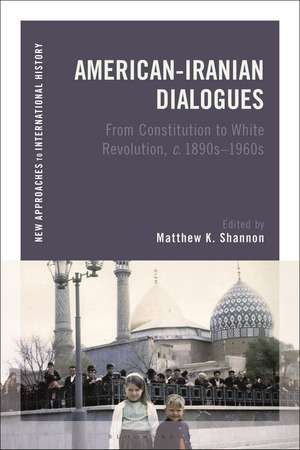American-Iranian Dialogues: From Constitution to White Revolution, c. 1890s-1960s: New Approaches to International History
Editat de Matthew K. Shannonen Limba Engleză Paperback – 28 iun 2023
| Toate formatele și edițiile | Preț | Express |
|---|---|---|
| Paperback (1) | 191.75 lei 43-57 zile | |
| Bloomsbury Publishing – 28 iun 2023 | 191.75 lei 43-57 zile | |
| Hardback (1) | 540.15 lei 43-57 zile | |
| Bloomsbury Publishing – 3 noi 2021 | 540.15 lei 43-57 zile |
Din seria New Approaches to International History
- 19%
 Preț: 168.15 lei
Preț: 168.15 lei - 8%
 Preț: 154.50 lei
Preț: 154.50 lei -
 Preț: 160.18 lei
Preț: 160.18 lei -
 Preț: 144.84 lei
Preț: 144.84 lei - 7%
 Preț: 134.66 lei
Preț: 134.66 lei - 7%
 Preț: 149.02 lei
Preț: 149.02 lei - 17%
 Preț: 177.88 lei
Preț: 177.88 lei - 7%
 Preț: 148.75 lei
Preț: 148.75 lei - 8%
 Preț: 153.45 lei
Preț: 153.45 lei - 14%
 Preț: 165.91 lei
Preț: 165.91 lei - 13%
 Preț: 167.24 lei
Preț: 167.24 lei - 13%
 Preț: 180.88 lei
Preț: 180.88 lei - 14%
 Preț: 186.19 lei
Preț: 186.19 lei - 13%
 Preț: 176.74 lei
Preț: 176.74 lei - 14%
 Preț: 147.24 lei
Preț: 147.24 lei - 23%
 Preț: 192.36 lei
Preț: 192.36 lei - 7%
 Preț: 149.02 lei
Preț: 149.02 lei - 7%
 Preț: 148.29 lei
Preț: 148.29 lei - 21%
 Preț: 217.91 lei
Preț: 217.91 lei - 20%
 Preț: 219.46 lei
Preț: 219.46 lei - 13%
 Preț: 180.88 lei
Preț: 180.88 lei - 23%
 Preț: 192.30 lei
Preț: 192.30 lei - 30%
 Preț: 571.01 lei
Preț: 571.01 lei - 14%
 Preț: 539.25 lei
Preț: 539.25 lei - 22%
 Preț: 227.23 lei
Preț: 227.23 lei - 13%
 Preț: 201.34 lei
Preț: 201.34 lei - 30%
 Preț: 510.68 lei
Preț: 510.68 lei - 13%
 Preț: 175.85 lei
Preț: 175.85 lei - 22%
 Preț: 656.47 lei
Preț: 656.47 lei
Preț: 191.75 lei
Preț vechi: 249.57 lei
-23% Nou
Puncte Express: 288
Preț estimativ în valută:
36.69€ • 38.41$ • 30.36£
36.69€ • 38.41$ • 30.36£
Carte tipărită la comandă
Livrare economică 07-21 aprilie
Preluare comenzi: 021 569.72.76
Specificații
ISBN-13: 9781350228139
ISBN-10: 1350228133
Pagini: 252
Dimensiuni: 156 x 234 x 25 mm
Greutate: 0.36 kg
Editura: Bloomsbury Publishing
Colecția Bloomsbury Academic
Seria New Approaches to International History
Locul publicării:London, United Kingdom
ISBN-10: 1350228133
Pagini: 252
Dimensiuni: 156 x 234 x 25 mm
Greutate: 0.36 kg
Editura: Bloomsbury Publishing
Colecția Bloomsbury Academic
Seria New Approaches to International History
Locul publicării:London, United Kingdom
Caracteristici
Blends English and Persian source materials from archives, university libraries, cultural centres, personal papers, oral history, film, literature and cultural texts
Notă biografică
Matthew K. Shannon is Associate Professor in History, Emory & Henry College, USA. He is the author of Losing Hearts and Minds: American-Iranian Relations and International Education during the Cold War (2017).
Cuprins
List of FiguresList of IllustrationsNotes on Contributors Introduction1. Flags of Inconvenience: State Failure, Nationhood, and Contested Sovereignty in the late Qajar Encounter with the United States, John Ghazvinian2. The Shuster Mission of 1911 and American Perceptions of Iran's First Revolution, Matthew Shannon3. U.S.-Iran Relations through the Lens of Heritage Diplomacy: The Case of the Iranian Antiquities Bill of 1930, Kyle Olson4. A Literary-Political Turn to Left: American Literature and Politics of Reception in Iran, Behnam M. Fomeshi5. Pandering in the Persian Gulf: Iran, Arabia, and Anglo-American Relations, 1900-1971, Firoozeh Kashani-Sabet6. De-Nationalized: Mohammed Reza Pahlavi, the Consortium, and Global Oil, 1953-1963, Gregory Brew7. Alborz, Bethel, and Community: Missionary Institutions in Postwar Tehran, Matthew K. Shannon8. American Academics and U.S. Technical Aid for Iranian Modernization, Richard Garlitz9. 'We Learned How to be Friends': What Oral History tells us about the American Peace Corps in Iran, Jasamin Rostam-Kolayi10. "Support the 41": Iranian Student Activism in Northern California, 1970-1973, Ida Yalzadeh11. Professional Transnationalism and Iranian-American Im/mobility in Michigan, Camron Michael AminConclusion: Third Parties, Non/state Actors, and the Ambiguities of U.S. Imperial PowerBibliographyIndex
Recenzii
Matthew K. Shannon has brought together twelve outstanding scholars to produce a collection of essential reading for anybody interested in the history of US-Iranian relations. It makes a vital contribution to the literature by shedding light on the role played by non-state actors in this transnational relationship.
